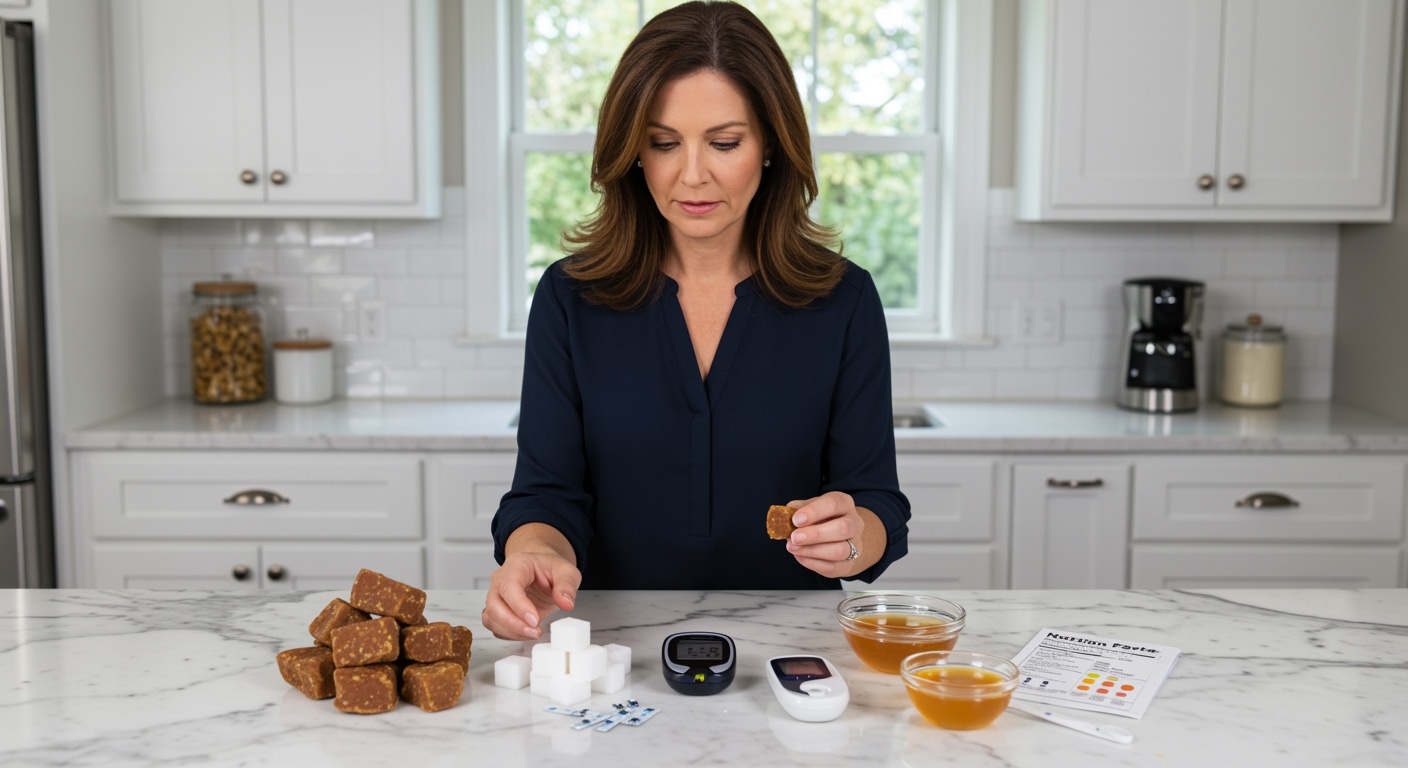✪ Key Takeaway: Jaggery raises blood sugar almost as much as white sugar and is not safe for diabetics despite being natural.
Introduction
Your grandmother swears by jaggery as a healthy sugar alternative.
You might be wondering if this golden-brown sweetener is actually safe for your diabetes management.
Hi, I’m Abdur, your nutrition coach and today I’m going to reveal the complete truth about jaggery and diabetes that most people get dangerously wrong.
What Exactly Is Jaggery And How Does It Affect Blood Sugar?
Jaggery is unrefined sugar made from sugarcane juice or palm sap.
The production process involves boiling the juice until it solidifies into blocks.
This traditional method preserves some minerals and vitamins that white sugar loses during processing.
However, jaggery contains approximately 65-85% sucrose, which is nearly identical to white sugar.
When you eat jaggery, your digestive system breaks down the sucrose into glucose and fructose.
These simple sugars enter your bloodstream rapidly, causing your blood glucose levels to spike within 15-30 minutes.
Research shows that jaggery has a glycemic index of 84, which is dangerously high for diabetics.
✪ Fact: Jaggery contains 97% carbohydrates, making it almost pure sugar despite its natural origin.
Does The Natural Processing Make Jaggery Safer For Diabetics?
Many people believe that natural processing makes jaggery healthier than refined sugar.
This is a dangerous misconception that leads diabetics to consume excessive amounts.
While jaggery retains small amounts of iron, potassium, and magnesium, these nutritional benefits are minimal.
You would need to consume large quantities to get meaningful amounts of these nutrients.
The problem is that consuming enough jaggery for nutritional benefits would cause severe blood sugar spikes.
Studies comparing jaggery and white sugar show nearly identical effects on blood glucose levels.
Your pancreas responds to jaggery by releasing the same amount of insulin as it would for regular sugar.
✪ Pro Tip: Natural does not automatically mean diabetic-friendly when it comes to high-sugar foods.
How Much Jaggery Can A Diabetic Safely Consume?
The honest answer is that no amount of jaggery is truly safe for diabetics.
Even small portions can cause significant blood sugar elevation.
If you absolutely must use jaggery, limit yourself to 5 grams maximum per day.
This tiny amount equals about half a teaspoon and contains roughly 4 grams of sugar.
Always consume jaggery with fiber-rich foods like vegetables or whole grains to slow sugar absorption.
Monitor your blood glucose levels before and after consuming jaggery to understand your individual response.
Many diabetics find that even this small amount causes their blood sugar to rise above target ranges.
✪ Note: Your medication timing and current blood sugar levels affect how jaggery impacts your glucose readings.
What Are Better Sweetener Alternatives For Diabetics?
Instead of risking blood sugar spikes with jaggery, choose proven safe alternatives.
Stevia is a natural, zero-calorie sweetener that does not affect blood glucose levels.
Monk fruit sweetener provides intense sweetness without any carbohydrate content.
Erythritol tastes similar to sugar but has minimal impact on blood sugar.
These alternatives allow you to enjoy sweet flavors without compromising your diabetes management.
You can also train your taste buds to appreciate natural sweetness from fruits in controlled portions.
Cinnamon, vanilla extract, and other spices can add flavor complexity without sugar.
✪ Pro Tip: Gradually reduce sweetener use to retrain your palate and reduce sugar cravings naturally.
The Bottom Line
Jaggery is not a safe sugar alternative for diabetics despite its natural origins and minimal nutritional benefits.
Natural does not mean diabetic-friendly when sugar content remains dangerously high.
I would love to hear about your experiences with different sweeteners or any questions you have about managing diabetes through nutrition in the comments below.
References
At NutritionCrown, we use quality and credible sources to ensure our content is accurate and trustworthy. Below are the sources referenced in creating this article:
- Fitterfly: Is Jaggery or Gur Really Good for Diabetes?
- Apollo247: Jaggery and Diabetes Safe Substitute for Sugar
- Sprint Medical: Jaggery for Diabetes
- Muditam: Sugar vs Jaggery Better for Diabetes





